unit1 where did you go on vacation
Unit_1_Where_did_you_go_on_vacation 全文

Unit 1 Where did you go on vacation?SECTION ALanguage Goal:Talk about past events.Where did you go on vacation?I went to the mountains.1a Match the activities with the pictures [ a-g].1. stayed at home f 5. went to the mountains c2. went to New York City b 6. went to the beach a3. visited my uncle g 7. visited museums e4. went to summer camp d★1b Listen and number the people in the picture [ 1-5 ]. Conversation 1Xiang Hua: Hey, Tina. Where did you go on vacation?Ti na: I went to the mountains with my family.Xiang Hua: Did everyone have a good time?Tina: Oh,yes.Everything was excellent.Where did you go, Xiang hua? Xiang Hua: I went to New York City.Conversation 2Girl: What did you do on vacation,Sally?Sally: Nithing.I just stayed at home.Girl: And did you do anything interesting,Bob?Bob : Yes,I visited my uncle.We went fishing,but we didn’t get any fish. Conversation 3Boy: Did you go anywhere on vacation,Tom?Tom: I went to summer camp.Boy: Did you go with anyone?Tom: Yes,I went with my friends.Everyone had a great time.★2a Listen.Where did the people go on vacation? Complete the chart. Conversation 1Boy: Where did you go on vacation, Grace?Grace: I went to New York City.Boy: Oh, really? Did you go with anyone?Grace: Yes, I went with my mother.Boy: Did you go to Central Park?Grace: Yes,I did.It was really nice.Boy: Did you buy anything special?Grace: Yes.I bought something for my father.Boy: Oh,Really?What?Grace: I bought him a hat.Conversation 2Girl: Where did you go on vacation, Kevin? Kevin: I went to the beach.Girl: Oh, that’s nice. Did you play volleyball? Kevin: No, I didn’t.Girl: Well, did you swim?Kevin: Yes, I did. The water was really warm.Girl: How was the food?Kevin: Everything tasted really good!Girl: Did you meet anyone interesting?Kevin: Yes.I met some very interesting people. Conversation 3Boy: Where did you go on your vacation, Julie? Julie: I stayed at home.Boy: Oh. So, did you do anything interesting? Julie: No, I didn’t.Boy: Did you study for tests?Julie: Yes, I did.Boy; Did you go out with anyone?Julie: No.No one was here.Everyone was on vacation.2c Role-play the conversation.A: Grace,where did you go on vacation?B: I went to New York City.A: Oh,really? Did you go with anyone?B: Yes, I went my mother.2d Role-play the conversation. RickRick: Hi, Helen. Long time no see.Helen: Hi, Rick. Yes, I was on vacation last month.Rick: Oh, did you go anywhere interesting?Helen: Yes, I went to Guizhou with my family.Rick: Wow! Did you see Huangguoshu Waterfall?Helen: Yes, I did. It was wonderful! We took quite a few photos there. What about you? Did you do anything special last month?Rick: Not really. I just stayed at home most of the time to read and relax.3a Fill in the blanks with the words in the box and practice theLinda: Did you do anything fun on your vacation, Alice?Alice: yes, I did. I went to Sanya.Linda: How did you like it?Alice: Well, it was my first time there. So everything was really interesting. Linda: Did you go with anyone ?Alice: Yes, I did. I went with my sister.Linda: Did you go shopping?Alice: Of course. I bought something for my parents, but nothing for myself.Linda: Why didn’t you buy anything for yourself?Alice: I didn’t really see anything I liked.Section B1a Match the words with the pictures below.1. Delicious f 3. exciting c 5. terrible b2. expensive a 4. cheap e 6. boring d1b.look at the words in 1a again. Write ☺words on the left. Write ☻words on the right.☺words ☻ wordsdelicious terriblecheap expensiveexciting boring1c Listen. Lisa is talking about her vacation. Answer the questions.1.Where did Lisa go on vacation? She went to Hong Kong.2. Did she do anything special there? What was it?Yes, she went to a fun park.3. Did she buy anything for her best friend? Yes, she did.4. Did Lisa like her vacation? Yes, she did.1d Listen again and fill in the blanks.What did Lisa say about..?her vacation great the people (really) friendlythe fun park(really)exciting the food delicious the stores (very)expensive1e Ask and answer questions about Lisa’s vacation. Begin your2b Read Jane’s diary entries about her vacation and answer the questions. Did Jane have a good time on Monday? What about on Tuesday?Monday, July 15thI arrived in Penang in Malaysia this morning with my family. It was sunny and hot, so we decided to go to the beach near our hotel. My sister and I tried paragliding. I felt like I was a bird. It was so exciting. For lunch, we had something very special--Malaysian yellow noodles. They were delicious! In the afternoon, we rode bicycles to Georgetown. There are a lot of new buildings now, but many of the old buildings are still there. In Weld Quay, a really old place inGeorgetown, we saw the houses of the Chinese traders from 100 years ago. I wonder what life was like here in the past. I really enjoyed walking around the town.Tuesday, July 16thWhat a difference a day makes! My father and I decided to go to Penang Hill today. We wanted to walk up to the top, but then it started raining a little so we decided to take the train. We waited over an hour for the train because there were too many people. When we got to the top, it was raining really hard. We didn’t have an umbrella so we were wet and cold. It was terrible! And because of the bad weather, we couldn’t see anything below. My father didn’t bring enough money, so we only had one bowl of rice and some fish. The food tasted great because I was so hungry!2d Complete the conversation using information in the diary entries. Anna: Hi, Jane. Where did you go on vacation last week?Jane: I went to Penang in Malaysia .Anna: who did you go with?Jane: I went with my family .Anna: what did you do?Jane: The weather was hot and sunny on Monday, so we went paragliding on the beach. Then in the afternoon, we rode bicycles to Georgetown.Anna: Sounds great!Jane: Well, but the next day was not as good. My father and I went to Penang Hill,but the weather was really bad and rainy. We waited a long time for the train and we were wet and cold because we forgot to bring an umbrella .Anna: Oh, no!Jane: And that’s not all! We also didn’t bring enough money, so we only had one bowl of rice and some fish.2e Imagine Jane went to Penang Hill again and had a great day. Fill in the blanks in her diary entry with the correct forms of the verbs in brackets.Thursday, July 18thToday was (be) a beautiful day. My father and I went (go) to Penang Hill again, but this time we walked (walk) to the top. We started (start) at 9:30 a.m. and saw (see) lots of special Malaysian flowers along the way. About one hour later, we stopped (stop) and drank (drink) some tea. Then we walked (walk) for another two hours before we got (get) to the top. I was (be) quite tired, but the city looked (look) wonderful from the top of the hill!3a Complete the diary entry about a trip to one of these places. Use theAugustToday the weather was hot and sunny . I went to Tianánmen Square/the Place Museum/a Beijing hutong. It was interesting/ beautiful .We took some photos/bought something special. I liked this place because I learned something important. For dinner we had Beijing duck. It was delicious . In the evening, I felt really tired .3b Answer the questions to make notes about a vacation you took.1.Where did you go?2. Did you go with anyone?3. How was the weather?4. What did you do every day?5. What food did you eat?6. What did you like best?7. Did you dislike anything?8. How did you feel about the trip?3c Write a travel diary like Jane’s on page 5. Use your notes in 3b.Thursday, August 1stToday I went to the Palace Museum. It was cool. Then I went to visit the Great Wall. How great it is! I took many photos there. In the afternoon, I went to Tian’an Men Square. The square is very large. Today is Chinese Army Day. So there were many people there and it was very crowded. We had great fun playing there! At last, we traveled around BeijingHutong on three-wheelers. The Chinese people are very friendly. I felt very happy today, but I was really tired.4.Imagine you are all of foreigners on vacation in China. You meet each other at the airport on your way home. Talk about what you did on your vacation.Hi, my name’s Paul. Hi, Paul. I’m Anna. Where did you go on vacation?I went to Nanjing. Oh, I went to Beijing. Did you do anything special in Nanjing? Self Check1. A: Did anyone go on vacation with you last month?B: Yes, my family went to the countryside with me.2. A: Did your family go to the beach with you last weekend?B: No. No one from my family went, but my friend went with me.3. A: I didn’t bring back anything from Malaysia.B: Nothing at all? Why not?4. A: Did you buy anything in the shopping center?B: No, I didn’t. Everything was very expensive.5. A: How was the volleyball game yesterday?B: Great! Everyone had a fun time!plete the passage with the correct forms of the verbs in brackets. Last August, our class did (do) something very special on our school trip. We went (go) to Mount Tai. We started (start) our trip at 12:00 at night. Everyone in our class took (take) a bag with some food and water. After three hours, someone looked at the map and found (find) out we were not (be, not) anywhere near the top. My legs were (be) so tired that I wanted to stop. My classmates told (tell) me to keep going, so I went (go) on. At 5:00 a.m., we got to the top! Everyone jumped (jump) up and down in excitement. Twenty minutes later, the sun started (start) to come up. It was so beautiful that we forgot (forget) about the last five hours!。
八年级上册unit1wheredidyougoonvacation课文重难点讲解

Unit 1 Where did you go on vacation ?课文重难点讲解【教师寄语】The reason why a great man is great is that he resolves to be a great man.伟人之所以伟大,是因为他立志要成为伟大的人Section A1. Where did you go on vacation ? 你去哪儿度假?【解析】vacation [və'keɪʃn] n假期= holidayon vacation 在度假take a vacation 去度假winter vacation 寒假summer vacation 暑假①I have a lot of _______________every year . (vacation)( ) ②—Where did Sarah go on vacation? —She went to America.A. on vacationB. take a vacationC. is on vacationD. is for vacation2. Kevin meet anyone interesting?凯文遇到有趣的人了吗?【解析1】someone [sʌmwʌn] pron 某人anyone [eniwʌn] pron任何人everyone [evriwʌn] pron每人,人人【注】不定代词作主语,谓语动词用单数Is everyone here ?Did she go to the park with __________last year? ( someone)【解析2】interest v 使感兴趣→interesting adj. 有兴趣的→interested adj. 感兴趣的be interested in 对……感兴趣The students are __________in these ______books.( interest)【注】以—ing结尾的adj. 常用来作定语或表语,修饰物。
Unit1--Where-did-you-go-on-vacation
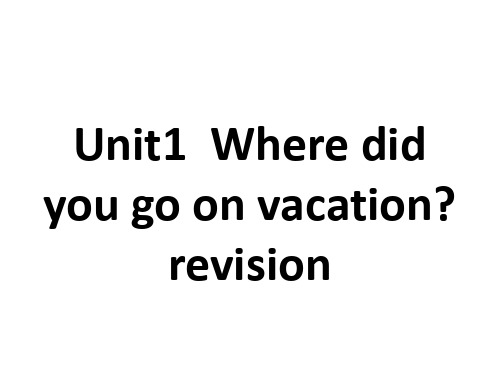
The songs sound beautiful.这些歌曲听起来 很优美。
过得高兴,玩得愉快
have a good\great\fun time (=enjoy oneself)
They had a good time yesterday.= They enjoyed themselves yesterday.
find—found找到
2.不定代词和不定副词的用法
some
body
any
one
every thing
no
where(疑问副
词)不定代词和不定副词
(1)左边的some、any、every、no与右 边的body、one、thing构成不定代词, some、any、every、no与右边的疑问副 词where构成不定副词;
2. 回顾一下在3b中所回答的问题的情况,然后 将这些句子按恰当的逻辑顺序排列在一起, 形成条理清晰的一段文字。
3. 可根据旅行经历再加一些恰当想像的句子。 4. 再次,阅读一遍短文,看有没有错误的句
子。
假如你和你的家人在四月八号这天参观了北 京,请你以日记的形式把这天的经历及感受 记录下来。 提示:1. 早上:参观颐和园(爬万寿山;在 昆明湖划船) 2. 中午:吃北京烤鸭 3. 下午: 逛王府井大街 参考词汇:颐和园 the Summer Palace; 万寿山 Longevity Hill;昆明湖Kunming Lake;王府井大街 Wangfujing Street;风 景 scenery
1. 定基调 体裁:应用文(日记);日记的主体部分为 记叙文 时态:谈过去的经历时,用一般过去时。 人称:写个人经历时,用第一人称。
Unit 1 Where did you go on vacation

Unit 1 Where did you go on vacation?(一)重点短语Section A 1a-1c1.go on vacation\holiday去度假2.stay at home待在家里3.go to summer camp去(参)加夏令营4.go to the mountains去爬山5.go to the beach去海滩Section A 2a-2d1.go with sb.和某人去2.buy anything special购买任何特别的东西3.play volleyball打排球4.study for tests\exams备考,为考试而学习5.go out with sb.和某人出去6.Long time no see.=I haven’t seen you for ages.好久不见。
7.on vacation=on holiday在度假8.Huangguoshu Waterfall黄果树瀑布9.quite a few+复数名词,许多,相当多10.What about you? =How about you?那你呢?st month上个月12.Not really.没什么,没做什么。
13.most of the time大多数时候14.a few 一些,少数,几个Section A Grammar focus (3a-3c)1.no one=nobody没有人,没人2.buy sth. for sb.为某人买东西3.have a good time =have a wonderful time =have a great time =have a good day=have fun=enjoy oneself过得愉快,玩得开心4.go to Sanya去三亚5.How did you like it?=What did you think of it?你觉得怎么样?6.first time第一次7.go shopping=do some shopping去购物8.of course=certainly=sure当然9.buy sth. for oneself为自己买东西10.in the family在家里11.in the countryside在乡下,在农村12.the only problem唯一的问题13.bye for now就此别过,该说再见啦14.at a restaurant在一家饭店15.keep a diary写日记16.Hong Kong香港Section B 1a-1e1.best friend最好的朋友,好朋友2.fun park游乐场,娱乐公园Section B 2a-2b1.what activities什么活动2.arrive in到达大地点3.arrive at到大小地点4.get to到达5.this morning这天早上,今天早上6.try paragliding尝试滑翔伞运动,尝试跳伞活动7.feel like感觉,觉得8.Malaysian yellow noodles马来西亚黄面条9.ride bicycle to+地点,骑自行车到某地10.a lot of=lots of=many/much许多11.new buildings新的建筑物(楼房)12.many of...许多......13.the house of......的房子14.Chinese trader中国商人15.from 100 years ago 从100年以前16.in the past在过去17.walk around the town=walk all over the town在小镇上四处走走18.go to Penang Hill去槟城山19.walk up to徒步走到20.a little一点,一些21.take the train乘火车22.wait for等候,等待23.too many people许多人,太多人24.too many许多,太多(修饰复数名词)25.get to the top到达山顶26.because of因为,由于27.28.have one bowl of rice吃一碗米饭29.taste great吃起来很美味Section B 2c-2est week上周,上个星期2.go paragliding去跳伞3.on the beach在海滩上4.wait a long time for等了很长时间5.bring an umbrella带伞,带雨伞6.the next day第二天7.That’s not all.那还不算,那不是全部,不止这些。
Unit1 Where did you go on vacation
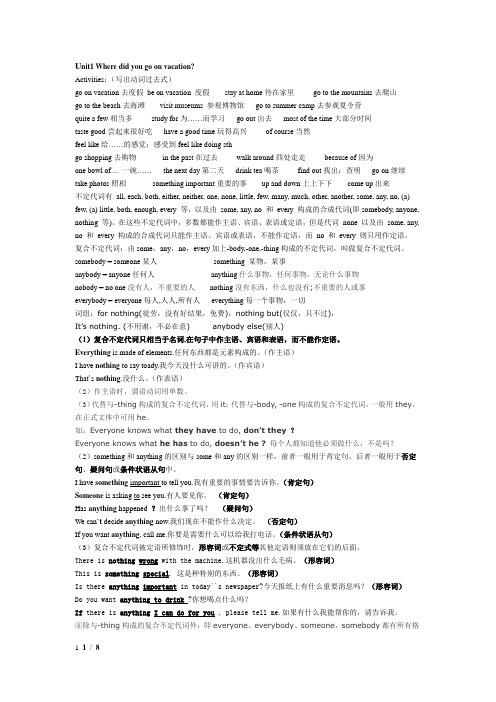
U nit1 Where did you go on vacation?Activities:(写出动词过去式)go on vacation去度假be on vacation 度假stay at home待在家里go to the mountains去爬山go to the beach去海滩visit museums 参观博物馆go to summer camp去参观夏令营quite a few相当多study for为……而学习go out出去most of the time大部分时间taste good尝起来很好吃have a good time玩得高兴of course当然feel like给……的感觉;感受到feel like doing sthgo shopping去购物in the past在过去walk around四处走走because of因为one bowl of…一碗……the next day第二天drink tea喝茶find out找出;查明go on继续take photos照相something important重要的事up and down上上下下come up出来不定代词有all, each, both, either, neither, one, none, little, few, many, much, other, another, some, any, no, (a) few, (a) little, both, enough, every 等,以及由some, any, no 和every 构成的合成代词(即somebody, anyone, nothing 等)。
在这些不定代词中,多数都能作主语、宾语、表语或定语,但是代词none 以及由some, any, no 和every 构成的合成代词只能作主语、宾语或表语,不能作定语,而no 和every 则只用作定语。
八年级上英语unit1 where did you go on vacation

必备短语补充:
1.go to the summer camp 参加夏令营 2.Keep a diary 写日记 3.take photos 拍照 4.stay at home 待在家 5.study for 为…而学习 6.go on 继续 7.go out 出去 e up 出来, 升起 9,find out 查明;弄清 10.rain hard 下大雨 11. up and down上上下下 12. one /a bowl of …一碗…. 13. nothing to do …but…除……之外,无事可做
So…that… 如此……以至于: 考点一: So…that… 句型中,so后面跟形容词或者副词,that后跟 从句表示结果。 考点二:可与“too…to do sth. 和…enough to do sth. ”等句式进行同意转换。 My legs were so tired that I wanted to stop. He’s so young that he can’t go to school. =he is too young to go to school. =he isn’t old enough to go to school.
八年级上册英语unit1 where did you go on vacation?
本单元句型总结:
1. Where did you go on vacation? 2. Long time no see. 3.Did you do anything special last month? 4.How did you like it? 5. How was your vacation? 6.It was so beautiful that we forget about the last five hours.
Unit1 Where did you go on vacation
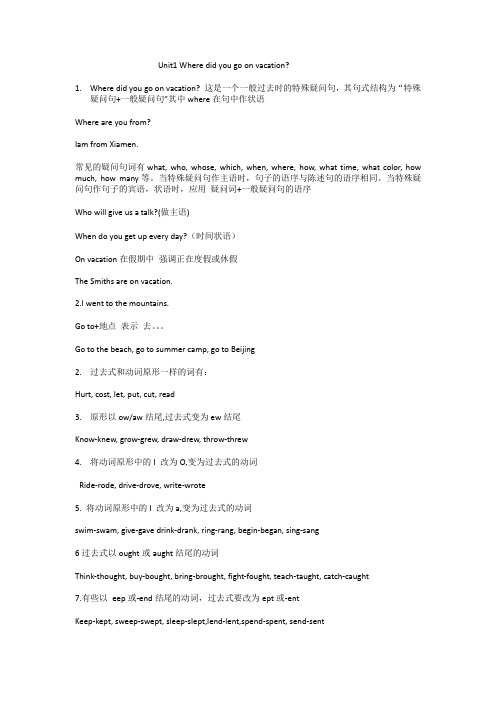
Unit1 Where did you go on vacation?1.Where did you go on vacation? 这是一个一般过去时的特殊疑问句,其句式结构为“特殊疑问句+一般疑问句”其中where在句中作状语Where are you from?Iam from Xiamen.常见的疑问句词有what, who, whose, which, when, where, how, what time, what color, how much, how many等。
当特殊疑问句作主语时,句子的语序与陈述句的语序相同。
当特殊疑问句作句子的宾语,状语时,应用疑问词+一般疑问句的语序Who will give us a talk?(做主语)When do you get up every day?(时间状语)On vacation在假期中强调正在度假或休假The Smiths are on vacation.2.I went to the mountains.Go to+地点表示去。
Go to the beach, go to summer camp, go to Beijing2.过去式和动词原形一样的词有:Hurt, cost, let, put, cut, read3.原形以ow/aw结尾,过去式变为ew结尾Know-knew, grow-grew, draw-drew, throw-threw4.将动词原形中的I 改为O,变为过去式的动词Ride-rode, drive-drove, write-wrote5. 将动词原形中的I 改为a,变为过去式的动词swim-swam, give-gave drink-drank, ring-rang, begin-began, sing-sang6过去式以ought或aught结尾的动词Think-thought, buy-bought, bring-brought, fight-fought, teach-taught, catch-caught7.有些以eep或-end结尾的动词,过去式要改为ept或-entKeep-kept, sweep-swept, sleep-slept,lend-lent,spend-spent, send-sent8.Did you go with anyone?你和别人一起去的吗?这是实义动词过去时态的一般疑问句。
八年级英语上册 unit 1 where did you go on vacation(短语+句型+练习)(新版)人教新目标版
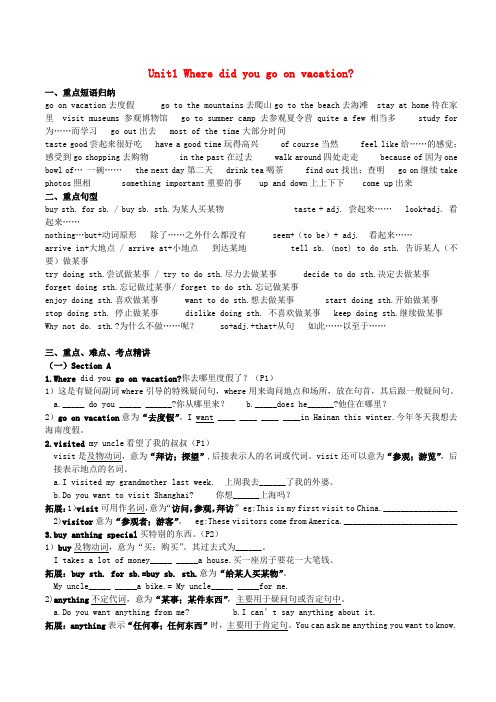
Unit1 Where did you go on vacation?一、重点短语归纳go on vacation去度假 go to the mountains去爬山go to the beach去海滩 stay at home待在家里 visit museums 参观博物馆 go to summer camp去参观夏令营quite a few相当多 study for 为……而学习 go out出去 most of the time大部分时间taste good尝起来很好吃 have a good time玩得高兴 of course当然 feel like给……的感觉;感受到go shopping去购物 in the past在过去 walk around四处走走 because of因为one bowl of…一碗…… the next day第二天 drink tea喝茶 find out找出;查明 go on继续take photos照相 something important重要的事 up and down上上下下 come up出来二、重点句型buy sth. for sb. / buy sb. sth.为某人买某物 taste + adj. 尝起来…… look+adj. 看起来……nothing…but+动词原形除了……之外什么都没有 seem+(to be)+ adj. 看起来……arrive in+大地点 / arrive at+小地点到达某地 tell sb. (not) to do sth. 告诉某人(不要)做某事try doing sth.尝试做某事 / try to do sth.尽力去做某事 decide to do sth.决定去做某事forget doing sth.忘记做过某事/ forget to do sth.忘记做某事enjoy doing sth.喜欢做某事 want to do sth.想去做某事 start doing sth.开始做某事stop doing sth. 停止做某事 dislike doing sth. 不喜欢做某事 keep doing sth.继续做某事Why not do. sth.?为什么不做……呢? so+adj.+that+从句如此……以至于……三、重点、难点、考点精讲(一)Section A1.Where did you go on vacation?你去哪里度假了?(P1)1)这是有疑问副词where引导的特殊疑问句,where用来询问地点和场所,放在句首,其后跟一般疑问句。
Unit 1 Where did you go on vacation知识点归纳及练习
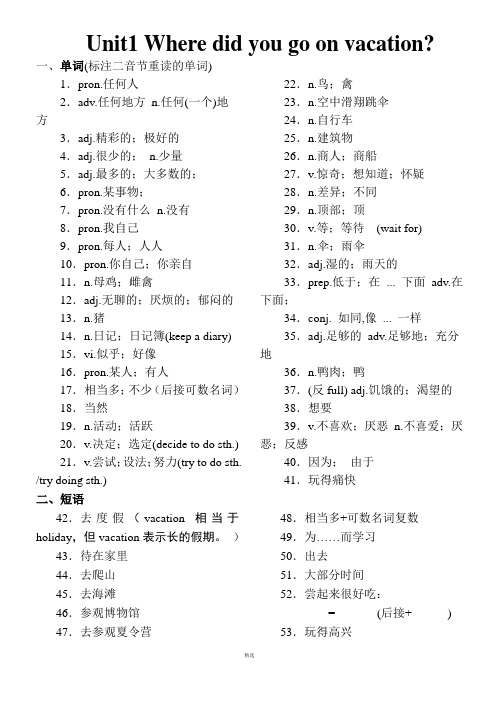
Unit1 Where did you go on vacation?一、单词(标注二音节重读的单词)1.pron.任何人2.adv.任何地方n.任何(一个)地方3.adj.精彩的;极好的4.adj.很少的;n.少量5.adj.最多的;大多数的;6.pron.某事物;7.pron.没有什么n.没有8.pron.我自己9.pron.每人;人人10.pron.你自己;你亲自11.n.母鸡;雌禽12.adj.无聊的;厌烦的;郁闷的13.n.猪14.n.日记;日记簿(keep a diary)15.vi.似乎;好像16.pron.某人;有人17.相当多;不少(后接可数名词)18.当然19.n.活动;活跃20.v.决定;选定(decide to do sth.)21.v.尝试;设法;努力(try to do sth. /try doing sth.)22.n.鸟;禽23.n.空中滑翔跳伞24.n.自行车25.n.建筑物26.n.商人;商船27.v.惊奇;想知道;怀疑28.n.差异;不同29.n.顶部;顶30.v.等;等待(wait for)31.n.伞;雨伞32.adj.湿的;雨天的33.prep.低于;在... 下面adv.在下面;34.conj. 如同,像... 一样35.adj.足够的adv.足够地;充分地36.n.鸭肉;鸭37.(反full) adj.饥饿的;渴望的38.想要39.v.不喜欢;厌恶n.不喜爱;厌恶;反感40.因为;由于41.玩得痛快二、短语42.去度假(vacation相当于holiday,但vacation表示长的假期。
)43.待在家里44.去爬山45.去海滩46.参观博物馆47.去参观夏令营48.相当多+可数名词复数49.为……而学习50.出去51.大部分时间52.尝起来很好吃:= (后接+ ) 53.玩得高兴54.当然55.给……的感觉;感受到:(后接+ )56.去购物57.在过去58.四处走走59.一碗…… 60.喝茶61.找出;查明62.继续63.去旅行64.照相65.上上下下66.出来;出版三、重点句式1.你买特别的东西了吗?Did you buy ?2.所有的东西尝起来真的很好吃!Everything tasted !3.你去哪里度假了?4.我为爸爸买了一些东西。
unit-1-Where-did-you-go-on-vacation知识总结
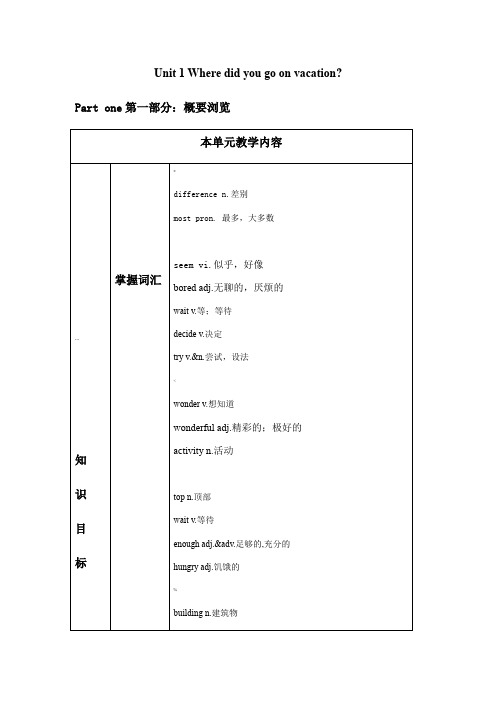
Unit 1 Where did you go on vacation? Part one第一部分:概要浏览)Part two 第二部分;知识点详解单词与短语讲解(一)quite a few的用法a few 意为“一些,若干(=some)”,后跟可数名词复数形式。
quite a few 意为“相当多;不少(=many)”后跟可数名词复数形式。
We took ____ ____ _____ _____ in the park last weekend.上周末,我们在公园里拍了相当多的照片。
【拓展】:few/a few/quite a few/little/a little/quite a little的用法1.most + 名词泛指多数,无范围most students大部分学生2.most + of + the (this/that/those/these等)+名词,指某一范围内的多数。
______ _____ _______students go to school by bike.这些学生们中的多数骑自行车去上学。
;(三)seem的用法seem“好像”,既可以后跟___________,又可以后跟___________。
【活学活用】1.The pig seems ___________(healthy/ healthily).2.Tom seemed ___________(know/ to know) the test result.3.I seem__________(have)a cold【拓展】(1.It seems+that从句看起来好像…;似乎….It seems that he is happy.=He seems _____ _____ happy. 他似乎很快乐。
2.seem like….好像,似乎…..It seems like a good idea.它似乎好像一个好主意。
Unit-1--Where-did-you-go-on-vacation-知识点汇总
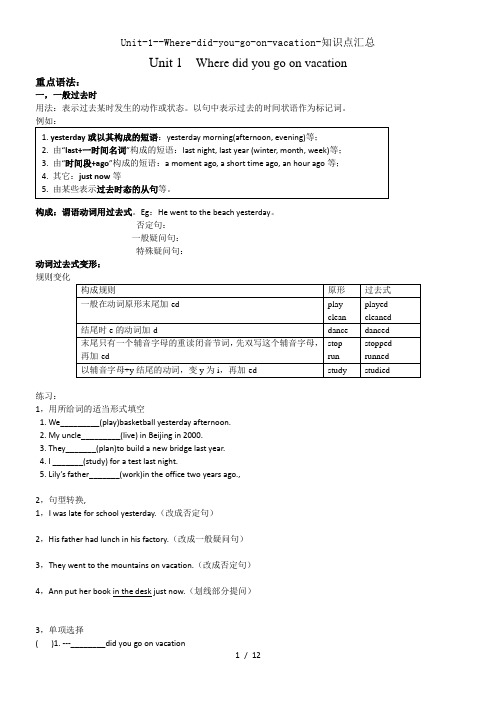
Unit 1 Where did you go on vacation 重点语法:一,一般过去时用法:表示过去某时发生的动作或状态。
以句中表示过去的时间状语作为标记词。
例如:构成:谓语动词用过去式。
Eg:He went to the beach yesterday。
否定句:一般疑问句:特殊疑问句:动词过去式变形:规则变化练习:1,用所给词的适当形式填空1. We_________(play)basketball yesterday afternoon.2. My uncle_________(live) in Beijing in 2000.3. They_______(plan)to build a new bridge last year.4. I _______(study) for a test last night.5. Lily’s father_______(work)in the office two years ago.,2,句型转换,1,I was late for school yesterday.(改成否定句)2,His father had lunch in his factory.(改成一般疑问句)3,They went to the mountains on vacation.(改成否定句)4,Ann put her book in the desk just now.(划线部分提问)3,单项选择( )1. ---________did you go on vacation---Hong Kong.A. WhatB. HowC. WhereD. When( )2. I_____my homework last night. I went to the cinema with my parents.A. didB. didn’tC. didn’t doD. don’t do( )3. ---Did they clean the house yesterday afternoon---_________. They cleaned it this morning.A. No, they don’tB. Yes, they didC. No, they didn’t C. Yes, they do( )4. ---_____Tom and Jim_____a walk yesterday evening---No, they____.A. Do; take; doesn’tB. Did; take; didn’tC. Did; take; didD. Do; take; don’t ( )5. ---The coat looks good on you. Where______you______it---In a supermarket.A. do; buyB. did; buyC. will; buyD. does; buy二、复合不定代词Did you go with anyone Did you find anything special用法:1,作主语时,谓语动词用单数Everone (be)here.2, 被形容词修饰时,形容词必需后置。
八年级英语上Unit 1 Where did you go on vacation

Unit 1 Where did you go on vacation?知识目标:1.复合不定代词2.一般过去时的规则动词与不规则动词Section AStep 1 . Words Expression1. vacation n. 假期;休假【常用搭配】on vacation 在度假;在假期中go on vacation 去度假take a vacation at/in 在....度假【辨析】holiday & vacation两者都指工作日以外的休息时间,但不包括周末或仅仅一天的休息日;holiday 多用于英式英语;vacation 多用于美式英语。
2. anyone pron. 肯定句意为“任何人”;否定和疑问句意为“有人”anyone不定代词,相当于anybody. 做主语时,谓语动词用单数形式。
反义词someone = somebody 用于肯定句中。
【辨析】anyone& any one【中考链接】--- Can you cook eggs with tomatoes?--- Yes, of course. A can do it, because it is easy, I think.A. AnyoneB. SomeoneC. No oneD. None of us3. everyone pron. 每人;人人;所有人,相当于everybody。
作主语时,谓语动词用单数形式。
Everyone in our class likes Mr.Liu. 我们班的每个人都喜欢刘老师。
【辨析】everyone & every oneeveryone 只用来指人,等同于everybody,其后不可接介词of;every one是两个词,既可指人,也可以指物,后面可跟介词of。
4. most adj. 最多的,大多数的adv. 最;最多;最大程度地pron. 最多;大多数【用法点拨】most of........做主语时,谓语动词的单复数取决于of 后的名词,of 后的名词是复数则谓语动词用复数形式,否则用单数形式。
Unit_1_where_did_you_go_on_vacation知识点详解
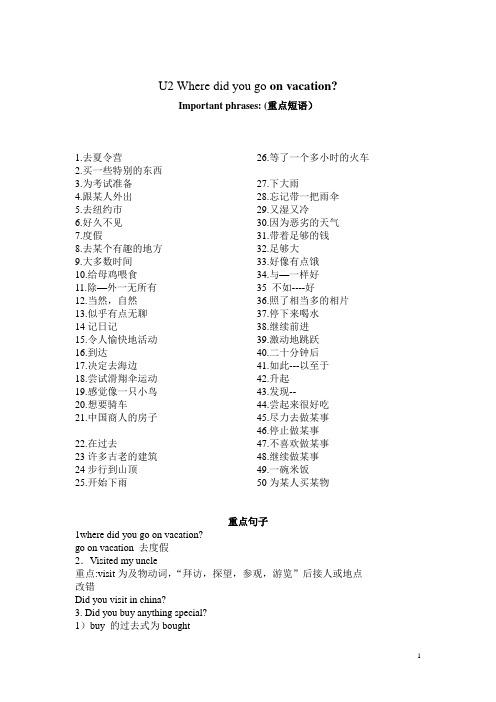
U2 Where did you go on vacation?Important phrases: (重点短语)1.去夏令营2.买一些特别的东西3.为考试准备4.跟某人外出5.去纽约市6.好久不见7.度假8.去某个有趣的地方9.大多数时间10.给母鸡喂食11.除—外一无所有12.当然,自然13.似乎有点无聊14记日记15.令人愉快地活动16.到达17.决定去海边18.尝试滑翔伞运动19.感觉像一只小鸟20.想要骑车21.中国商人的房子22.在过去23许多古老的建筑24步行到山顶25.开始下雨26.等了一个多小时的火车27.下大雨28.忘记带一把雨伞29.又湿又冷30.因为恶劣的天气31.带着足够的钱32.足够大33.好像有点饿34.与—一样好35 不如----好36.照了相当多的相片37.停下来喝水38.继续前进39.激动地跳跃40.二十分钟后41.如此---以至于42.升起43.发现--44.尝起来很好吃45.尽力去做某事46.停止做某事47.不喜欢做某事48.继续做某事49.一碗米饭50为某人买某物重点句子1where did you go on vacation?go on vacation 去度假2.Visited my uncle重点:visit为及物动词,“拜访,探望,参观,游览”后接人或地点改错Did you visit in china?3. Did you buy anything special?1)buy 的过去式为boughtbuy sth.for sb.=buy sb sth.我为Tom买了一个礼物2)anything 不定代词“某物,某事”主要用于疑问句和否定句中一旦anything用于可定句中,则意为“任何事,任何东西”Eg You can ask me anything you want to know3)★形容词修饰不定代词要后置4.Oh,did you go anything interesting?这是一般过去时中不含was/were的句子在变一般疑问句时,需用助动词did。
Unit 1 Where did you go on vacation课文翻译
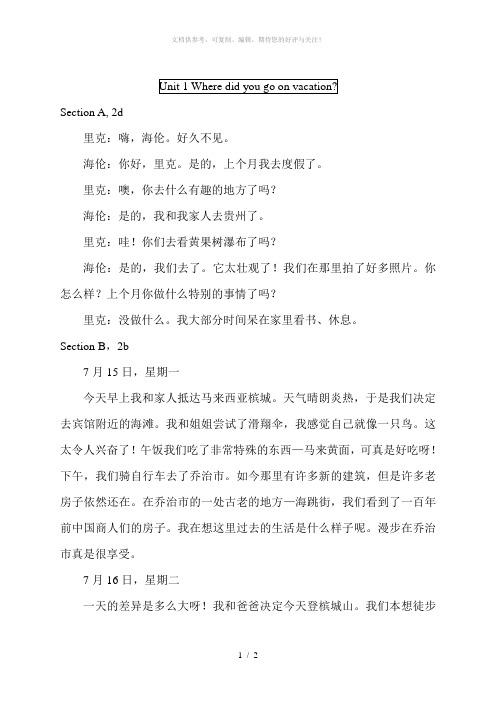
Section A, 2d
里克:嗨,海伦。
好久不见。
海伦:你好,里克。
是的,上个月我去度假了。
里克:噢,你去什么有趣的地方了吗?
海伦:是的,我和我家人去贵州了。
里克:哇!你们去看黄果树瀑布了吗?
海伦:是的,我们去了。
它太壮观了!我们在那里拍了好多照片。
你怎么样?上个月你做什么特别的事情了吗?
里克:没做什么。
我大部分时间呆在家里看书、休息。
Section B,2b
7月15日,星期一
今天早上我和家人抵达马来西亚槟城。
天气晴朗炎热,于是我们决定去宾馆附近的海滩。
我和姐姐尝试了滑翔伞,我感觉自己就像一只鸟。
这太令人兴奋了!午饭我们吃了非常特殊的东西—马来黄面,可真是好吃呀!下午,我们骑自行车去了乔治市。
如今那里有许多新的建筑,但是许多老房子依然还在。
在乔治市的一处古老的地方—海跳街,我们看到了一百年前中国商人们的房子。
我在想这里过去的生活是什么样子呢。
漫步在乔治市真是很享受。
7月16日,星期二
一天的差异是多么大呀!我和爸爸决定今天登槟城山。
我们本想徒步
到山顶,但是天下起了小雨,于是我们决定乘坐火车。
因为人太多,我们等了一个多小时的火车。
当我们到达山顶的时候,雨下得真大。
我们没有带雨伞,结果我们(被淋得)又湿又冷,真是糟透了!并且因为糟糕的天气,底下的东西我们什么都看不到。
爸爸没有带足够的钱,所以我们只吃了一碗米饭和鱼。
因为我太饿了,饭的味道尝起来还真是不错!。
Unit-1-Where-did-you-go-on-vacation
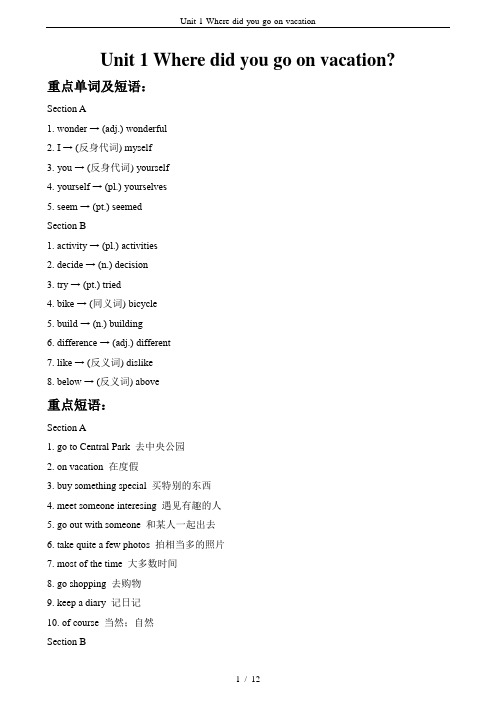
Unit 1 Where did you go on vacation?重点单词及短语:Section A1. wonder → (adj.) wonderful2. I → (反身代词) myself3. you → (反身代词) yourself4. yourself → (pl.) yourselves5. seem → (pt.) seemedSection B1. activity → (pl.) activities2. decide → (n.) decision3. t ry → (pt.) tried4. bike → (同义词) bicycle5. build → (n.) building6. difference → (adj.) different7. like → (反义词) dislike8. below → (反义词) above重点短语:Section A1. go to Central Park 去中央公园2. on vacation 在度假3. buy something special 买特别的东西4. meet someone interesing 遇见有趣的人5. go out with someone 和某人一起出去6. take quite a few photos 拍相当多的照片7. most of the time 大多数时间8. go shopping 去购物9. keep a diary 记日记10. of course 当然;自然Section B1. have a good time 玩得高兴;过得愉快2. go to the beach 去海滩3. feel like 感觉像4. the houses of the Chinese traders 中国商人的房子5. a lot of new buildings 许多新的建筑物6. in the past 在过去7. over an hour 一个多小时8. too many people 太多的人9. get to the top 到达顶部10. because of the bad weather 因为不好的天气11. one bowl of fish 一碗鱼肉12. another two hours 另外两个小时13. the top of the hill 山顶14. learn something important 学习重要的东西Self Check1. go to the countryside 去乡下2. in the shopping center 在购物中心3. have a fun time 玩得高兴;过得愉快4. after three hours 三个小时以后5. keep going 一直走6. twenty minutes later 20分钟后重点句子:1. Where did you go on vacation?你去哪儿度假的?2. Long time no see.好久不见。
八年级英语上册Unit 1 Where did you go on vacation《必备知识清单》

11. Of course! (P. 3)
of course意为“当然”,相当于sure或者certainly。
-May I borrow your dictionary? -Of course!
只修饰可数名词的量词有:a few, few, several, many, too many, a number of
既可以修饰不可数名词也可以修饰可数名词的量词有:some, any, a lot of, lots of, plenty of
7. I wonder what life was like here in the past. (P. 5)
feel like doing sth.=would like to do sth.=want to do sth.
Do you feel like going out for a walk with me?
=Would you like to go out for a walk with me?
=Do you want to go out for a walk with me?
enjoy用作及物动词,表示“喜欢”,后接名词、代词或者动名词作宾语。
Do you enjoy music?
I don’t enjoy sleeping with the window open.
9. What a difference a day makes! (P. 5)
本句是what引导的感叹句,what引导的感叹句常用的结构有:“What+a/an+形容词+单数可数名词+主语+谓语”或者“What+形容词+可数名词复数/不可数名词+主语+谓语”。
Unit 1 Where did you go on vacation 知识点精讲

Unit 1 Where did you go on vacation?一、重点短语go on vacation去度stay at home待在家里go to the mountains去爬山go to the beach去海滩visit museums 参观博物馆go to summer camp去参观夏令营quite a few相当多study for为……而学习go out出去most of the time大部分时间taste good尝起来很好吃have a good time玩得高兴of course当然feel like给……的感觉;感受到go shopping去购物in the past在过去walk around四处走走because of因为one bowl of…一碗……the next day第二天drink tea喝茶find out找出;查明go on继续something important一些重要的事up and down上上下下come up出来take photos照相二、句型集萃buy sth. for sb. / buy sb. sth.为某人买某物taste + adj. 尝起来……seem+(to be)+ adj. 看起来……keep doing sth.继续做某事arrive in+大地点/ arrive at+小地点到达某地tell sb. (not) to do sth. 告诉某人(不要)做某事try doing sth.尝试做某事try to do sth.尽力去做某事decide to do sth.决定去做某事forget doing sth忘记做过某forget to do sth.忘记做某事enjoy doing sth.喜欢做某事want to do sth.想去做某事stop doing sth. 停止做某事dislike doing sth. 不喜欢做某事Why not do. sth.?为什么不做……呢?so+adj.+that 如此……以至于……look+adj. 看起来……start doing sth.开始做某事三、单元重点、难点、考点精讲(一)Section A1.Where did you go on vacation?你去哪里度假了?(P1)1)这是有疑问副词where引导的特殊疑问句,where用来询问地点和场所,放在句首。
Unit_1_Where_did_you_go_on_vacation?单元知识点和练习题

Unit 1 Where did you go on vacation?一、知识点1. go on (a) vacation 去度假:be on (a)vacation 在度假/take a vacation休假2. go to the mountains去爬山go the beach 去沙滩go to the summer camp 去夏令营3.go+V-ing意为“去…”,多用于进行体育活动和业余娱乐活动,总结:go shopping/ go fishing/ go skating/ go swimming/ go camping/ go boating/ go hiking4. stay vi.停留,逗留,待在stay at home待在家里/ stay up (late)深夜不睡/熬夜5. most pron.大多数Most of后面的名词前要用冠词,人称代词用宾格;做主语时,of后的名词是复数,后面的谓语动词用复数;of后的名词是单数,后面的谓语动词用单数,如:Most of us like learning English. Most of the apples are delicious. / Most of the apple is bad.6. buy sth. for sb.(=buy sb. sth.)给某人买某物,如:I bought a pair of new glasses for my mother.=7. How do you think of….?你认为……怎么样?例如:你认为这个电影/这本书/这个国家/这个故事怎么样?=what do you think of …?/How do you feel about….?8 ed 和ing 结尾的动词9. seem好像,似乎,看起来①主语+seem to do sth. Your father seems to like playing tennis very much.(变否定句)②主语+seem (to be)+adj. The classroom seems (to be) very clean.③It seems +that从句It seems that it will snow soon./ It seems that you are not happy today.10. problem大的问题,难题,需要用行动解决;question因疑惑而提出的,需要口头回答。
八年级上册Unit 1 Where did you go on vacation单元语法知识汇总
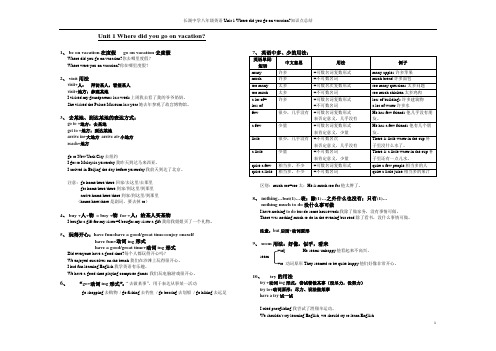
Unit 1 Where did you go on vacation?1、be on vacation在度假go on vacation去度假Where did you go on vacation?你去哪里度假?Where were you on vacation?你在哪里度假?2、visit用法visit+人:拜访某人,看望某人visit+地方:参观某地I visited my grandparents last week.上周我去看了我的爷爷奶奶。
She visited the Palace Museum last year.她去年参观了故宫博物馆。
3、去某地、到达某地的表达方式:go to +地方:去某地get to +地方:到达某地arrive in+大地方arrive at+小地方reach+地方go to New York City去纽约I got to Malaysia yesterday.我昨天到达马来西亚。
I arrived in Beijing the day before yesterday.我前天到达了北京。
注意:go home/here/there回家/去这里/去那里get home/here/there到家/到这里/到那里arrive home/here/there到家/到这里/到那里(home/here/there是副词,要去掉to)4、buy +人+物= buy +物for +人:给某人买某物I bought a gift for my sister.=I bought my sister a gift.我给我姐姐买了一个礼物。
5、玩得开心:have fun=have a good/great time=enjoy oneselfhave fun+动词ing形式have a good/great time+动词ing形式Did everyone have a good time?每个人都玩得开心吗?We enjoyed ourselves on the beach.我们在沙滩上玩得很开心。
Unit-1-Where-did-you-go-on-vacation优秀教案

Unit 1 Where did you go on vacation?Section A 1 (1a-2d)一、教学目标:1. 学生能掌握以下单词:anyone, anywhere, wonderful, quite a few, most,something, nothing, everyone, of course, myself, yourself能掌握以下句型:①—Where did you go on vacation? —I went to the mountains.②—Where did Tina to on vacation? —She went to the beach.③—Did you go with anyone? —Yes, I did./No, I didn’t.能了解以下语法:—复合不定代词someone, anyone, something, anything等的用法。
—yourself, myself等反身代词的用法。
一般过去时态的特殊疑问句,一般疑问句及其肯定、否定回答。
2. 学生会用一般过去时进行信息交流,培养学生的环保意识,热爱大自然。
二、教学重难点1. 教学重点:1) 用所学的功能语言交流假期去了哪里旅行。
2) 掌握本课时出现的新词汇。
2. 教学难点:1)复合不定代词someone, anyone, something, anything等的用法。
2) yourself, myself等反身代词的用法。
三、教学过程Ⅰ. Lead-in1. 看动画片来进入本课时的主题谈论上周末做了些什么事情,谈论过去发生的事情。
Ⅱ. Presentation1. Show some pictures on the big screen. Let Ss read the expressions.2. Pay attention to the pictures. Ask: What can you see? Say: Each picture shows what a person did on summer vacation. Name each activity and ask students to repeat: stayed at home, did volunteer work, went to Beijing, went to the beach, visited museums, went to summer campWork on 1a:3. Now, please match each phrase with one of the pictures next to the name of the activity,point to the simple answer.4. Check the answers. Answers: 1. f 2. b 3. g 4. e5. c6. a7. dIII. Listening1. Point to the picture on the screen.T: Look at the picture. Where did Tina go on vacation? She went to the mountains. There are three conversations. The people talk about what they did on vacation. Listen to the recording and write numbers of the names in the right boxes of the picture.2. Check the answers.3. Listen to the conversations again .IV.Pair work1. Point out the sample conversation. Ask two Ss to read the conversation to the class.2. Now work with a partner. Make your own conversation about the people in the picture.3. Ss work in pairs. As they talk, move around the classroom and give any help they need.4. Let some pairs act out their conversations.V. Listening1. Pre-ListeningT: Look at the picture. Where was this girl? Was she in a park? Or was she on the beach?Tell Ss they will hear three students’ conversationsLet Ss read the phrases in the chart of 2b.2. While-listeningWork on 2a: play the recording the first time. Ss listen and fill in the chart.Work on 2b: play the recording the second time for the Ss to check “Yes, I did.” or “No, I didn’t.”Check the answers with the Ss.3. Listen to conversation 1 and fill in the blanks.Grace went to _______________ for her vacation. She went with _____________. She went to Central Park, and she bought _______ for her father.Listen to conversation 2 and fill the blanks.Kevin went to beach for his vacation. He didn’t play __________, but he went ___________. The food tasted really good. And he met some __________________.Listen to conversation 3 and fill in the blanks.Julie stayed at home. She didn’t do anything interesting. She study for ______. Because everyone was on vacation, she _______ go out with anyone.掌握短语:go to the beach去海滩buy sth. for sb.(= buy sb. sth.)taste good尝起来不错stay at home待在家study for tests备考go out 外出(娱乐)VI. Pair work1. Let two Ss read the conversation between Grace, Kevin and Julie.2. Let Ss work in pairs and try to role-play the conversation.A: Grace, where did you go on vacation?B: I went to New York City.A: Oh, really? Did you go with anyone?B: Yes, I went with my mother.3. Ask some pairs to act out their conversations.VII. Reading and Role-play1. First let Ss read the conversation and match the people and places they went.2. Read the conversation and answer the questions.1) Where did Helen go on vacation? She went to Guizhou with her family.2) What did Helen do there? She saw Huangguoshu Waterfall and took quite a fewphotos there.3) What did Rick do last month? He just stayed at home most of the time to readand relax.3. Let Ss act out the conversations in pairs.VIII. Language points1. Did you buy anything special?在英语中,anything, something, nothing和everything是用于指代事物的复合不定代词,与之相对应的复合不定代词anyone, someone, no one和everyone (anybody, somebody, nobody和everybody) 用于指人。
- 1、下载文档前请自行甄别文档内容的完整性,平台不提供额外的编辑、内容补充、找答案等附加服务。
- 2、"仅部分预览"的文档,不可在线预览部分如存在完整性等问题,可反馈申请退款(可完整预览的文档不适用该条件!)。
- 3、如文档侵犯您的权益,请联系客服反馈,我们会尽快为您处理(人工客服工作时间:9:00-18:30)。
decide to do sth.决定去做某事 eg. I decide to make noodles this afternoon. try to do sth.尽力做某事 eg. I try to be number one. try doing sth.尝试做某事 eg. I try making cakes. feel like 感觉像…… eg.The little girl feels like a bird. feel like doing 想…… I feel like listening to music. in the past在过去 enjoy doing sth.喜欢做某事 eg. I enjoy singing.
• • • •
Sally Xiang Hua B ob Tom Tina
一般过去时标志词
• • • • • • • • last night; yesterday; two hours ago; three years later; after a week; before(在……之前); just now (刚才) then (那时)
ride a bicycle/ bicycles to +某地 eg. Zhang Wanrong rode a bicycle to school today. around the town在镇上 make a difference起作用、有关系、有影响 eg. Her words made a difference to my life. 她的话对我的人生产生了影响。 walk up to the top 走上山顶 walk up/down to +地点 走上/下某地
形容词
置于名词前
enough
副词
置于形容词后
eg. I don’t have enough time. (名词) But I am happy enough. (形容词)
forget to do sth.
forget doing sth.
忘记去做某事(事未 做) 忘记做过某事(事已 做)
eg. Some students often forget to do their English homework.(作业未做) My mom always forgets opening the door. (门已开,但忘了)
wait for 等待 eg. I am waiting for you/ a bus. over an hour超过一小时 because +句子 because of +名词/代词/名词性短语
eg. We didn’t go out because it rained heavily. (句子) We didn’t go out because of the heavy rain. (名词性短语)
• • • • • •
带回 根本,完全 发现,查明,找出 继续were so tired that I wanted to stop. 我的腿如此累,以致于我想停下来。
so+adj. that+句子…如此……以致于
eg. We were so happy that we jumped up and down.
too many(太多)
可数名词复 数 too much(太多) 不可数名词 much too(太) 形容词 eg. We have ______ homework. There are _______ students. I’m _______ happy.
stop to do sth.
stop doing sth.
指人
somebody(某人) anybody(某人/任何人) someone(某人) anyone(某人/任何人) nobody(没有人) no one (没有人) everybody(每个人) everyone (每个人)
somewhere,anywhere(某地)
指地点
few/ a few
•quite a few photos相当多的照片
• • • •
买特殊的某物 遇见有趣的某人 做有趣的某事 去有趣的某地
复合不定代词的用法
• 被定语修饰时,定语后置。
肯定句 something someone somebody somewhere
否定句 /疑问 句
anything
anyone
anybody
anywhere
复合不定代词
指物 something(某物/某事) anything(某物/某事/任何物/任何事) nothing(没有事情/没有东西) everything(所有事)
seem to be bored似乎感到厌烦 seem to do似乎…… eg. Everything seemed to be OK. • keep a diary记日记
-ing/-ed
• The book is boring. • • 这本书很无聊。 • The story is interesting.• 这个故事很有意思。 • I’m bored with the book. 我对这本书感到厌烦。 I’m interested in the story. 我对这个故事感兴趣。
-ing:令人….,一般修饰物 -ed:感到…,修饰人 eg. I’m bored with the boring book. 我对这个无聊的书感到厌烦。
A:What activities do you find enjoyable? B:I find _____________ enjoyable. sports meeting (n.) playing basketball (v-ing) it (pron.) find sth. enjoyable发现某事令人愉快 find sth. +adj.发现某事…… eg. I find the movie interesting. I find playing computer games boring.
eg.--- How do you like English? =What do you think of English? ---It’s interesting.
• of course当然 • for oneself为某人自己 I you(你) you(你们) we she he they myself yourself yourselves ourselves herself himself themselves
• • • • • • • •
go with someone go to Central Park study for tests go out with someone Long time no see. take photos quite a few most of the time
• • • • • • • •
• There is nothing (much) to do but do… • 除……之外,什么也做不了。 • eg. There is nothing much to do but listen to music. • I have nothing(much) to do but do… • 除了……,我没有事情可做。 • eg. I have nothing to do but listen to music.
表肯定 表否定 表肯定
修饰可数名 词复数 修饰不可数 名词
eg. I have _________ orange. Let’s buy some. I still have _______ orange. It’s enough. I have ___________oranges. Let’s buy some. I still have ________oranges. It’s enough.
开始做某事 start doing sth.(开始长期性、经常做的事情) start to do sth. eg. I started running in the morning. It started to rain.
few 几乎没有 表否定
a few little a little
一点 几乎没有 一点
和某人一起去 去中央公园 为测验学习 与某人外出 好久不见。 照相 相当多,不少 大多数时间
• • • •
buy something special meet someone interesting do something interesting go somewhere interesting
along the way one hour later another two hours look from the top of the hill
• • • •
沿路 一小时后 另外两小时 从山顶看
• • • • • •
bring back at all find out keep doing sth. go on jump up and down in excitement • come up
停下来去做另外一件事
停下正在做的某事
eg. On his way home, he stopped to buy a bread.
在回家的路上,他停下来买了个面包。
He was very tired, so he stopped playing the guitar. 他非常累,所以他不弹吉他了。
• • • •
复合不定代词的用法 • No one was here. • Everyone was on vacation. • Everything was excellent.
• 复合不定代词若用作主语, 其谓语动词一般用单数形式。
